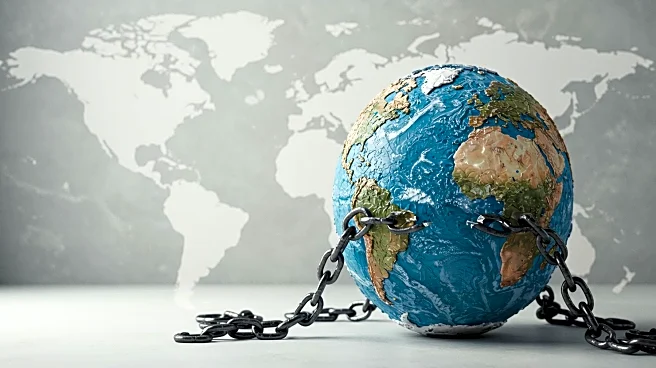What's Happening?
Negotiations aimed at establishing a global treaty to combat plastic pollution concluded in Geneva without reaching an agreement. Delegates from 184 countries were unable to agree on a treaty text that would impose limits on plastic production and regulate toxic chemicals used in plastics. The talks, which lasted 11 days, were hindered by opposition from the United States and other oil-producing nations like Saudi Arabia, who resisted measures to cap plastic production. Environmentalists, Indigenous leaders, and business executives participated in the discussions, advocating for a treaty that acknowledges their rights and knowledge. Despite the lack of consensus, delegates expressed hope for future negotiations.
Why It's Important?
The failure to reach a treaty on plastic pollution has significant implications for global environmental policy. Without a binding agreement, the production of plastic, which currently exceeds 400 million tons annually, is projected to increase by 70% by 2040. This poses a threat to ecosystems, as plastic waste continues to accumulate in landfills and oceans. The inability to regulate toxic chemicals in plastics also raises concerns about public health and environmental safety. Countries advocating for stricter controls may face challenges in implementing national policies without international support, potentially affecting industries reliant on plastic production.
What's Next?
Delegates have agreed to reconvene for future negotiations, although no specific timeline has been set. The United Nations Environment Programme's executive director, Inger Andersen, emphasized the need for continued efforts despite the setback. Some countries are considering changes to the decision-making process, potentially allowing for voting rather than requiring unanimous agreement. This could facilitate progress in future talks. Stakeholders, including environmental groups and nations advocating for stricter regulations, are likely to continue lobbying for a comprehensive treaty that addresses the full lifecycle of plastics.
Beyond the Headlines
The negotiations highlighted the complex interplay between environmental concerns and economic interests. The resistance from oil-producing countries underscores the economic reliance on plastic production, which is closely tied to fossil fuel industries. The discussions also brought attention to the role of Indigenous knowledge in environmental policy, as leaders sought recognition of their rights in the treaty. The outcome of the talks may influence future international environmental agreements, as countries grapple with balancing economic growth and sustainability.











